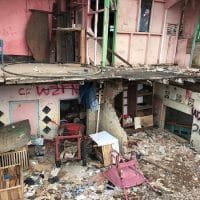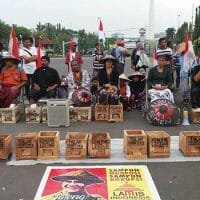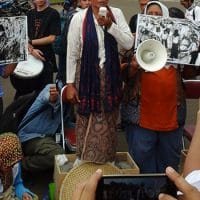-
Filming in the most depressing city on the Earth: Jakarta
It stinks, it is the most polluted city on earth, but that is not the most terrible thing about it.
-
There’s now proof that Soeharto orchestrated the 1965 killings
As Indonesia commemorates 20 years since the fall of the New Order military dictatorship, the foundation myth of the regime (and, indeed, the post-New Order state as well) remains stubbornly in place.
-
There is a structural crisis of capitalism
In this in-depth interview conducted in Dakar, Samir Amin speaks on a wide range of topics: globalisation; generalised monopoly capital; the alarming growth of inequality; the role of the state in the neoliberal era; globalisation and delinking; capitalism and modernity; the return of fascism in the contemporary capitalist world, and more.
-
No, U.S. didn’t ‘stand by’ Indonesian genocide – it actively participated
“Standing by,” however, is not what the United States did during the Indonesian genocide of 1965–66; rather, it actively supported the massacres, which were applauded at the time by the New York Times.
-
Kendeng Against Cement
Since March 13, 2017, over 50 local indigenous peasants known as Sedulur Kendeng, from Central Java, Indonesia, have been sitting with their feet in cement boxes in protest before the Presidential Palace. This is their second such protest in eleven months.
-
Cementing Dissent in Indonesia
The accelerating rate of land and resource dispossession in post-authoritarian Indonesia has led to a number of confrontations between state and corporate authorities on one side and peasant communities on the other. Many of these conflicts, though garnering much attention from sympathetic activists, remain localised. However, there are moments when peasants and their activist allies decide to scale up their direct action.
-
Job Loss, the Clintons, NAFTA, and a New Progressive Labor Rights Agenda
Today’s post discusses the way that neoliberal policies embraced by the Democratic Party resulted in job loss in key states. Bear with me: there are facts and figures here that make the case. Tomorrow, I will continue to discuss these issues in the context of “domestic” job displacement. The third post will discuss a progressive […]
-
Spanish Recollections: the 80th Anniversary of the International Brigades
In one hurrying day, eighty years ago, in Albacete, a center of Spain’s La Mancha region, a few officers somehow created quarters for five hundred men arriving the following day, then five hundred more, and more. Soon three or four thousand, somehow organized in units despite a mad variety of languages, were issued a motley […]
-
A History of a Counter-Revolution
Gerald Horne. The Counter-Revolution of 1776: Slave Resistance and the Origins of the United States of America. NYU Press, 2014. In the conventional, celebratory liberal historical narrative about the Founding Fathers, the post-revolutionary persistence of slavery in the United States, along with women’s lack of essential political and legal rights, has long been regarded as […]
-
Europe Between the Pit and the Pendulum
If you have ever read Edgar Allen Poe‘s gruesome stories you may recall feelings of horror like those which made me, still a youngster, cringe and shudder. I have similar feelings when I hear of bloodthirsty, barely-hidden “concerts” by German Neo-Nazis, which too often lead to violence against subjects of their hatred: hippy-type leftist youngsters […]
-
Losing Heads and Sending Arms
Two famous heads got lost in Berlin. Neither loss, I hasten to add, was connected with brutality. From the past or near future, they caused melancholy or rejoicing, depending on your viewpoint. One loss really occurred twenty-two years ago, when the 62-foot red granite statue of Lenin on East Berlin’s Lenin Square and Lenin Allee […]
-
Who Really Benefits From Sweatshops?
Consumers are ultimately the ones responsible for dangerous conditions in garment assembly plants in the Global South, Hong Kong-based business executive Bruce Rockowitz told the New York Times recently. The problem is that improved safety would raise the price of clothing, according to Rockowitz, who heads Li & Fung Limited, a sourcing company that hooks […]
-
All Sorts of Roguery? The ‘Financial Aristocracy’ and Government à Bon Marché in India
My voice is a crime, My thoughts anarchy, Because I do not sing to their tunes, I do not carry them on my shoulders. — Cherabandaraju, who was the lead accused in a “conspiracy case” involving poets and their poetry. It’s been two decades and a year since India’s elite embraced neo-liberalism. Money — the […]
-
Occupying the Immigration Debate
People in the United States may not be as rabidly anti-immigrant as we’ve been led to believe. An article posted on the Center for American Progress website in December, “The Public’s View of Immigration,” summarizes five recent U.S. opinion polls. Authors Philip E. Wolgin and Angela Maria Kelley find that while the media and the […]
-
Shashe Declaration: 1st Encounter of Agroecology Trainers in Africa Region 1
We are 47 people from 22 organizations in 18 countries (Zimbabwe, Mozambique, Democratic Republic of the Congo, Rwanda, Angola, Uganda, Tanzania, Kenya, Zambia, South Africa, Central African Republic, Brazil, Mexico, Indonesia, Portugal, USA, France, and Germany). We are farmers and staff representing member organizations of La Via Campesina, along with allies from other farmer […]
-
Middle Classes, American-style “Democracy,” and the Muslim Brotherhood
The middle classes as a whole rally around only the democratic objective, without necessarily objecting to the “market” (such as it is) or to Egypt’s international alignment wholesale. Not to be neglected is the role of a group of bloggers who take part, consciously or not, in a veritable conspiracy organized by the CIA. Its […]
-
Statement of Solidarity with the Queer Palestinian Call for Action “IGLYO Out of Israel”
Statement by the Coalition for Sexual and Bodily Rights in Muslim Society Palestinian queer activists from Al Qaws for Sexual & Gender Diversity in Palestinian Society, Aswat — Palestinian Gay Women, and PQBDS (Palestinian Queers for Boycott Divestment and Sanctions) have issued a joint statement on June 1st 2011 calling on organizations, groups and […]
-
The Ecological Rift: A Radical Response to Capitalism’s War on the Planet
John Bellamy Foster, Brett Clark, and Richard York. The Ecological Rift: Capitalism’s War on the Earth. Monthly Review Press, 2010. 544 pages. Climate change is often called the greatest environment threat facing humanity. The threat is very real. Unless we cut carbon pollution fast, runaway climate change will worsen existing environmental and social problems, and […]
-
The Struggles of a Muslim Communist
Partai Komunis Indonesia, or the Indonesian Communist Party, was at one point the largest communist party outside the Soviet Bloc. In 1965, hundreds of thousands, if not millions, of its members were systematically murdered under the watch and approval of General Suharto’s CIA-backed military. Historians estimate that between 500,000 and 2,000,000 communists were killed, […]
-
On the Arab Revolt: Interview with Vijay Prashad
Vijay Prashad is a prominent Marxist scholar from South Asia. He is George and Martha Kellner Chair in South Asian History and Professor of International Studies at Trinity College, Connecticut. He has written extensively on international affairs for both academic and popular journals. His most recent book The Darker Nations: A People’s History of the […]






